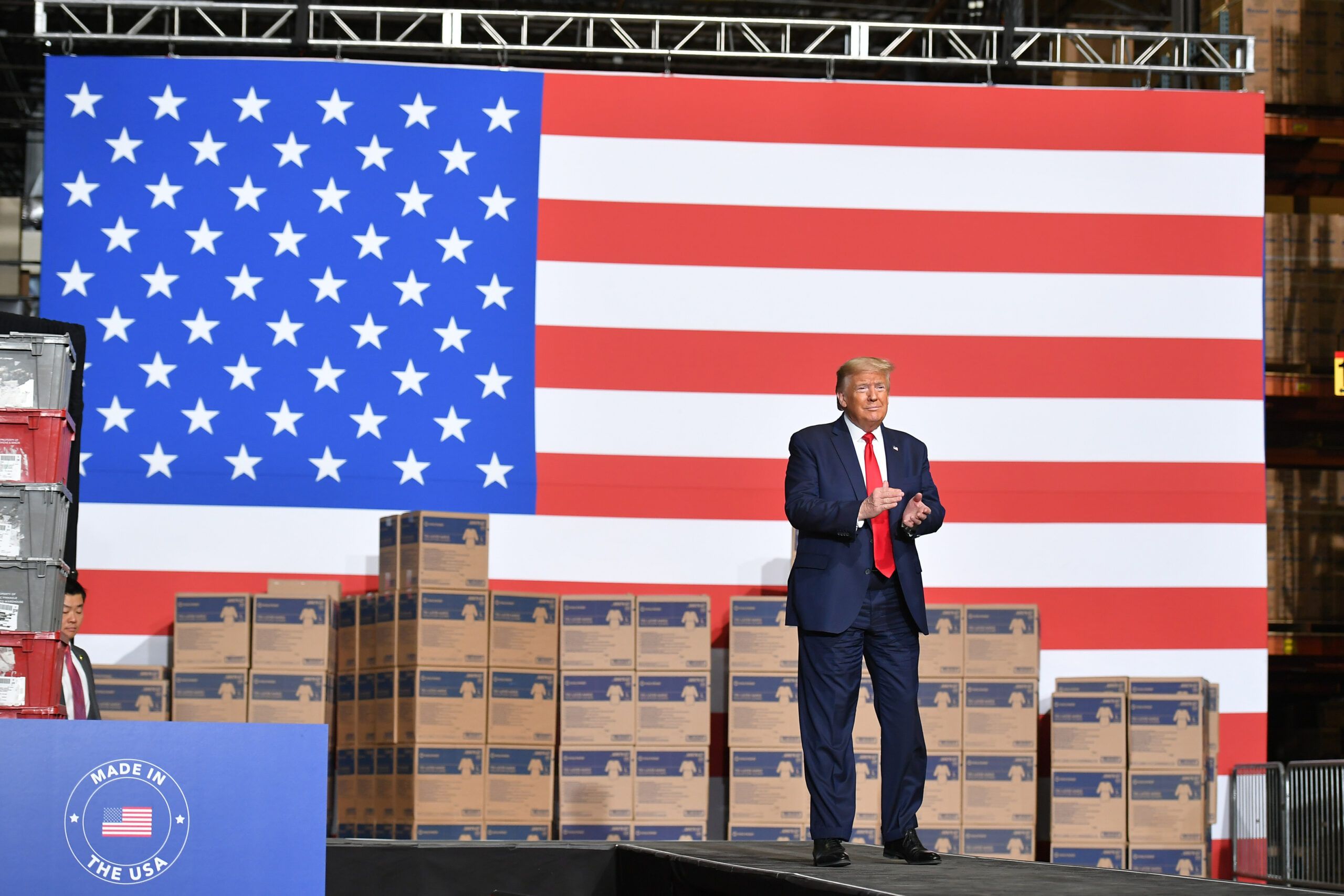Trump vs Biden: first it was wild — then came COVID-19
The coronavirus pandemic has put a temporary halt to traditional on-the-ground campaigning for the 2020 US election, but President Donald Trump has managed to make some speeches in battleground states like Arizona and Pennsylvania (MANDEL NGAN)
Washington (AFP) – President Donald Trump’s reelection battle against Joe Biden was always going to be wild — and then came the coronavirus, killing nearly 90,000 Americans, scuttling the economy and throwing the race into surreal confusion.
Less than six months before election day, neither candidate can campaign normally, voters wonder whether they’ll be safe, and Trump suddenly faces what amounts to a referendum on his handling of a once-in-a-century crisis.
“We really don’t know how this is going to play out,” politics professor Christopher Arterton at George Washington University told AFP.
Four months ago the narratives of the 2020 election seemed clear.
Touting record low unemployment and solid GDP growth, Trump promised four more years of a presidency molded on his persona of the hard-nosed businessman.
Biden, milking nostalgia for the now seemingly calm years of his vice presidency under Barack Obama, vowed to end the scandals and division of Trump’s reality show-style administration and restore “the soul of America.”
Biden, 77, led in polls, but many believed that Trump, 73, would seize the upper hand on November 3.
The last incumbent to lose reelection was George Bush in 1992 and, historically, presidents presiding over strong economies are almost invulnerable.
Exuding macho self-confidence, Trump toured the country for political rallies with his adoring right-wing base, and delivered a seductively simple message: aggressive nationalism abroad, jobs at home.
How, Trump openly wondered at his rallies, could the man he brutally insults as “Sleepy Joe” even compete?
Then the coronavirus tore up the script.
Trump wanted America praising his triumphs. Instead, his fate rests on how people will judge his handling of a disaster.
– Referendum election –
“This election will be primarily a referendum on President Trump,” said Allan Lichtman, a presidential historian at American University renowned for his accurate predictions of previous contests.
The COVID-19 crisis poses a test of leadership at least as high-stakes as the 9/11 attacks in 2001 or the massive 2008 recession.
And Trump thinks he’s more than passed.
“I’d rate it at 10,” he responded when asked once to grade his performance.
But many don’t agree.
They don’t like his divisive political style, his only rare demonstrations of empathy, and the haphazard marshalling of federal resources on testing and treatment.
According to the latest CBS poll, 57 percent of Americans think Trump has done a “bad job.” In March the number was 47 percent.
This might seem a golden opportunity for Biden. Instead, like millions of Americans, he has been locked down at home.
Although Trump has had to give up his beloved rallies, he still gets out occasionally on Air Force One and frequently dominates evening news broadcasts from the White House.
Biden, by contrast, has gone no further than his Delaware home’s garden, while relying on amateurish video platforms to communicate.
Yet ironically, Trump’s massive advantage may be working partly in Biden’s favor. Yes, Trump is in the spotlight, but what he does there enrages half the country.
“It has exposed all his flaws that were apparent throughout his presidency, but are much more immediate now in the lives of Americans,” Biden spokesman Michael Gwin said.
In other words, Biden doesn’t have to lift a finger.
“There is an old saying,” Lichtman noted: “‘Never interrupt an opponent when he is making a mistake.'”
– Wild cards –
Most days Biden rips the president on Twitter, as he did Thursday, saying Trump “failed the American people on every single front.”
But Gwin said the Democrat is wary of trying to out-attack the attacker-in-chief. “We need to present a better alternative.”
While the latest polls show Biden still ahead nationally, US presidential elections are decided by electoral college votes, meaning the result will likely come down to a handful of swing states like Florida and Wisconsin.
Polling there is tighter and Trump could retain the presidency even while winning fewer votes nationally than Biden — as happened in 2016 against Hillary Clinton.
And just one of a half dozen wild cards could make the difference.
– Will economic recovery start in the third quarter, as Trump predicts, allowing him to sell a powerful message of renewal?
– Will there be a foreign policy drama, perhaps a showdown over North Korea’s nuclear arsenal or conflict with Iran?
– What role will Russia play after sowing discord and misinformation in 2016?
– Will tension with China, which Trump is working overtime to make the coronavirus bogeyman, trigger a devastating new trade war?
But the biggest wild card, almost certainly, will be Trump himself. How far will he go in a last-ditch fight?
Already last year the Republican was impeached, though not convicted, in Congress for abusing his office to try and whip up a scandal around Biden in Ukraine.
Now he’s pushing a new conspiracy theory, claiming the existence of an “Obamagate” plot involving Biden to bring down his presidency.
In this atmosphere, six months will be an eternity.
Ultimately, Arterton said everything still hangs on one simple question: do more people adore or loathe this ultra-polarizing president?
“Is Donald Trump going to be so odious to a number of moderates…, independent voters and Democrats to drive turnout on the Democratic side as much as he’s capable of driving turnout on the Republican side?”
sms-elc-jca-mlm/dw
Disclaimer: Validity of the above story is for 7 Days from original date of publishing. Source: AFP.


